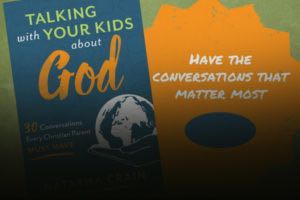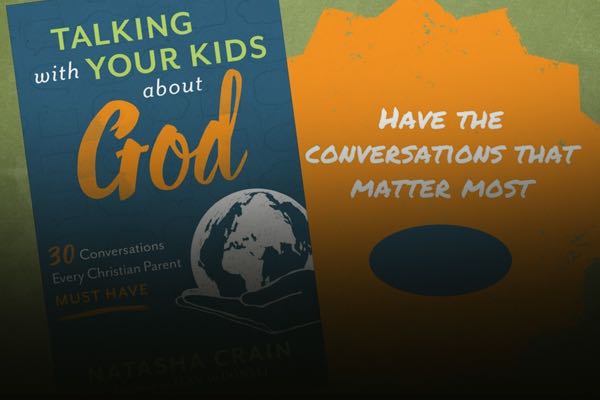
J. Warner:
Natasha, I love your personal story, but I know many of my readers may not have heard it. Can you tell us how you became interested in Christian Case Making (apologetics) and how you started writing books for parents?
Natasha:
Sure. In 2011, I decided to start a Christian parenting blog. I had three kids ages three and younger and was really just looking for an opportunity to engage with other Christian parents online. At the time I started the blog, I had never heard the word apologetics before, despite the fact I had been a lifelong Christian.
As my readership grew, people started sharing more and more of my blog posts. Those shares started bringing a consistent wave of nonbelievers to my site. They began leaving comments on my posts challenging all kinds of truth claims about Christianity, and they were challenges I had never even considered. They told me there wasn’t any evidence Jesus ever existed, that the Bible was filled with errors, that evolution had replaced a need for God, that there was no evidence for God’s existence, and much more. I had been blogging about much simpler things—like good worship songs for young kids. These comments blew me away. I realized I was raising kids in a VERY different world than the one in which I grew up and that I was totally unprepared as a parent. Honestly, I was a bit shocked as well at the realization that in 30-some years of being a Christian, the church had never confronted me with these issues.
So, I launched into an intense reading journey to learn everything I could about apologetics and turned my blog into a place where I then wrote to equip other parents with what I had learned. Over time, my readership took off and a publisher reached out to ask if I would be interested in writing apologetics books for parents. I was thrilled for the opportunity! My first book came out in March 2016 and my second one is out this month. Looking back, it amazes me to see how God used that little blog I started just 6 years ago for something I never planned!
J. Warner:
I had the pleasure of writing the forward to your first book, Keeping Your Kids on God’s Side: 40 Conversations to Help Them Build a Lasting Faith. Your new book, Talking with Your Kids about God: 30 Conversations Every Christian Parent Must Have, is titled similarly but I know it’s a very different book. Can you describe the difference for us?
Natasha:
Great question—they ARE very different but I know they sound alike at first!
Keeping Your Kids on God’s Side is a broad survey book of 40 important apologetics questions across the big areas of God, truth and worldviews, Jesus, the Bible, and science. It’s a big picture apologetics primer written specifically for parents.
Talking with Your Kids about God starts a series of books that takes one of the big areas from my first book at a time and digs into 30 new and deeper conversations on that subject. For example, this first one focuses on 30 conversations about God, while my next one, Talking with Your Kids about Jesus, will focus on 30 conversations about Jesus. One exciting new feature with this series is a conversation guide for every chapter that walks the parent step-by-step through questions to ask their kids in order to facilitate conversation on that chapter’s content. The guides are written in a way that makes them adaptable for elementary through high school age kids. Talking with Your Kids about God is a natural next reading step for those who read Keeping Your Kids on God’s Side, but parents who haven’t read my first book can also jump straight into this new series with no problem.
What my books have in common is that they’re written in an easy-to-understand, parent-to-parent style, with chapters only about 5 pages each.
J. Warner:
I’m not sure most Christian parents understand the need for an evidential approach to Christianity, and I know most haven’t taken the steps necessary to help their kids understand the evidence. Why is it so important for parents to prepare their kids in this way?
Natasha:
Perhaps the best way I’ve found to explain this is to liken it to climbing Mount Everest. Let’s say, for example, that your neighbor tells you they plan to climb this mountain next year. When you ask how they’ll prepare they say:
I have some really comfortable roller skates that have always worked well for me to build leg strength, so I’m going to skate around the neighborhood more often.
I enjoy jump roping, so I’m going to do 50 jumps each day to really work on my heart rate.
I need to gain arm strength, so I’m going to use 2-pound weights each day.
I know I’ll be stressed at some point while hiking, so I will also be learning meditation to deal with that.
What would happen to your neighbor if he or she tried to climb Mount Everest with that training? They would die! You can’t prepare for significant challenges in whatever ways are most comfortable or make the most sense to you personally. You need to get informed about 1) the challenges you will face and 2) what it takes to successfully meet those challenges.
Parents today are sending their kids into a world with a Mount Everest of faith challenges yet think they can prepare them with a few jumping jacks of memory verses, mealtime prayers, and weekly church. This is simply naïve. Through my books, I hope to educate parents on what the mountain looks like today, equip them with a corresponding training plan, and come alongside them with practical tools.
J. Warner:
You’ve organized this book in a special, accessible manner. What was your strategy and why are the chapters arranged the way they are?
Natasha:
I wanted the books in this series to be readily adaptable for use in a variety of learning settings—home, homeschool, church classes, small groups, or youth groups. To facilitate that, I sequenced the chapters in a curriculum-oriented way; each chapter and each section builds on the last for a cumulative learning experience. By the end of this first book, you will have read and/or taught through five key “units”: The Existence of God, Science and God, The Nature of God, Believing in God, and The Difference God Makes. Additionally, as I mentioned before, each of the 30 chapters has a conversation guide which can easily be adapted for different ages and settings. I like to think of it as a combination book, curriculum, and participant’s guide!
J. Warner:
What is the one thing you hope parents will gain from reading your book?
Natasha:
Confidence that they have the understanding they need to have these conversations with their kids. So many parents I talk to feel unequipped or underequipped when presented with the challenges skeptics offer today. It can feel intimidating to see the claims the world makes and not know where to begin to unravel those things with our kids. I want parents who read my book to feel confident that 1) they understand specifically what the key challenges are today, and 2) they know how to discuss them effectively with their kids.
Natasha Crain will continue to be an important resource for Christian parents who want to equip their kids. Talking with Your Kids about God: 30 Conversations Every Christian Parent Must Have is an important addition to the growing library of apologetics resources for Christians raising young children. Now, more than ever, Christian parents must learn how to make the case for Christianity and raise up another generation of Christian Case Makers.

J. Warner Wallace is a Dateline featured Cold-Case Detective, Senior Fellow at the Colson Center for Christian Worldview, Adj. Professor of Christian Apologetics at Talbot School of Theology, Biola University, author of Cold-Case Christianity, God’s Crime Scene, and Forensic Faith, and creator of the Case Makers Academy for kids.
Subscribe to J. Warner’s Daily Email
J. Warner Wallace is a Dateline featured cold-case homicide detective, popular national speaker and best-selling author. He continues to consult on cold-case investigations while serving as a Senior Fellow at the Colson Center for Christian Worldview. He is also an Adj. Professor of Christian Apologetics at Talbot School of Theology, Biola University, and a faculty member at Summit Ministries. He holds a BA in Design (from CSULB), an MA in Architecture (from UCLA), and an MA in Theological Studies (from Gateway Seminary).






































